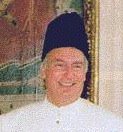Since my ill-advised and much-regretted visit to Didi’s World, I’ve begun to notice the subtle omnipresence of Aga Khan in Kampala. This morning his kindly visage watched over me as I made my purchases in the local grocery store, and after lunch I saw an call for applications to the Karachi-based Aga Khan University in the New Vision. Now I’m sitting in the outdoor restaurant of his newest five-star hotel, the Serena, trying to unlock the mystery of this stately gentleman whose official portrait — swaddled in white, wearing a fez — is as prevalent as President Museveni’s.
Preliminary research (read: Wikipedia) has informed me that the Aga Khan, formerly Prince Karim Khan, was born on December 13, 1936 to Shia playboy Prince Aly Khan and Joan Guinness, the ex-wife of Guiness brewing fortune heir Loel Guinness. His parents divorced when he was 13, and his father later remarried Great American Love Goddess Rita Hayworth. Sexual intrigues of his parents aside, who is the Aga Khan? What makes him tick? And, above all, why is his picture plastered in every other commercial establishment in Uganda?
At the tender age of 20, Aggie rose to the position of Imam in an unprecedented generational skip. In his will, the Aga Khan III (Aggie’s grandfather) cited the discovery of atomic science as the main reason for choosing his successor. Why Aga Khan III chose young Aggie after taking such an interest in the upbringing of his son — even sending Prince Aly to Cairo brothels at the age of 18 to ensure that he attained a level of sexual prowess befitting the leader of the Shia Ismaili Muslims — is beyond me, but the late Khan was not always known for his rationalism: his 1931 “If I Were a Dictator” speech proposed regular mandatory use for all world citizens of golf courses, tennis courts, cricket, football and hockey grounds as well as the recombination of African nations into five large states: Northwestern, Egypt, Sudan, Central and Southern (though “Natal, being so preponderatingly British, might be given the option to contract out”).
Aggie seems to have overcome some of his family’s eccentricities, though he shares his father’s penchant for beautiful women. In 1969 he married British supermodel Sarah Frances Croker-Poole, whose main claim to fame is the couple’s $78 million divorce 25 years later. He also owns the largest horsebreeding establishment in France, the intriguingly titled Aga Khan Studs, whose prize stallion Shergar the Wonder-Horse was kidnapped in 1983 by suspected members of the IRA (Aggie refused to pay the demanded £2m ransom, and the horse and his abductors were never found).
Though his horses and the whole overseeing the spiritual welfare of 15 million Muslims thing keep Aggie pretty busy, he still finds time for various other pursuits. His name graces the Aga Khan Development Network, which runs nearly 100 development projects in 26 countries and has a net worth of over $1 billion; he is also in charge of the most prestigious global architecture award, a network of five-star hotels throughout East Africa and Asia, two Canadian car dealerships and a world-record-breaking speedboat.
Some have questioned Aggie’s handling of the undisclosed amount of money he receives from Ismaili tithers each year, though the global consensus seems to be that the Aga Khan Development Network is among the most respectable, most effective development agencies in the world.
 As for Uganda and why Aggie’s countenance smiles down upon me wherever I go, that question is still unanswered. I choose to view him as a benevolent Big Brother figure, trusting that whatever happens — whether I come up against a massive natural disaster or find myself in need of a $2500/night suite in Mombasa — the Aga Khan will be there for me, cheerfully helping me make the world a better place.
As for Uganda and why Aggie’s countenance smiles down upon me wherever I go, that question is still unanswered. I choose to view him as a benevolent Big Brother figure, trusting that whatever happens — whether I come up against a massive natural disaster or find myself in need of a $2500/night suite in Mombasa — the Aga Khan will be there for me, cheerfully helping me make the world a better place.

